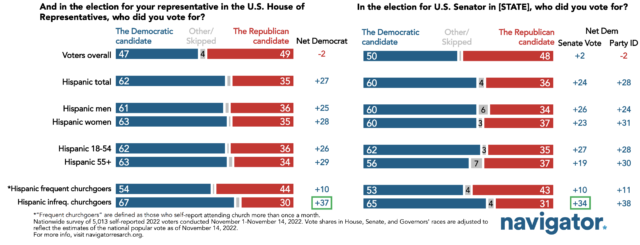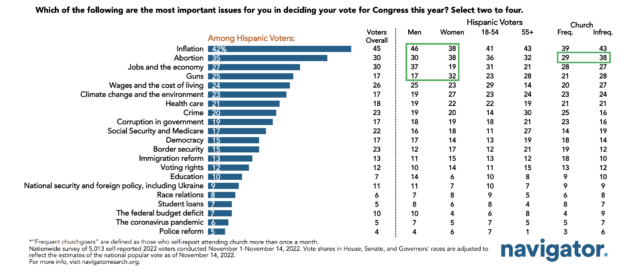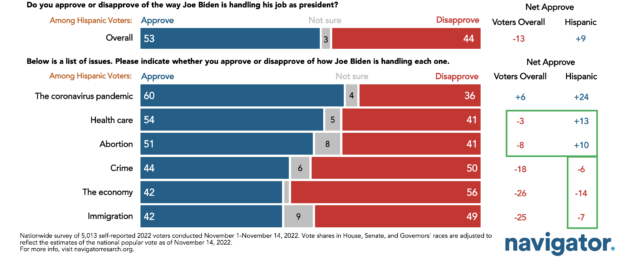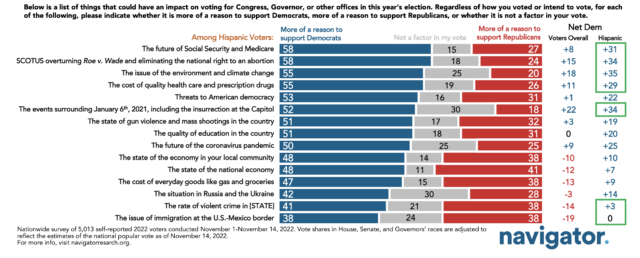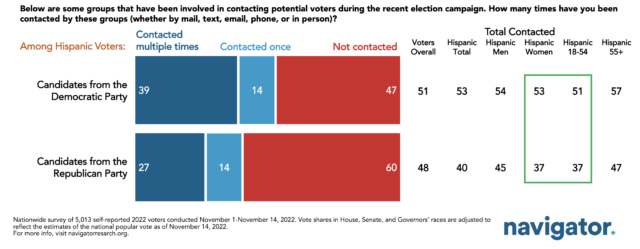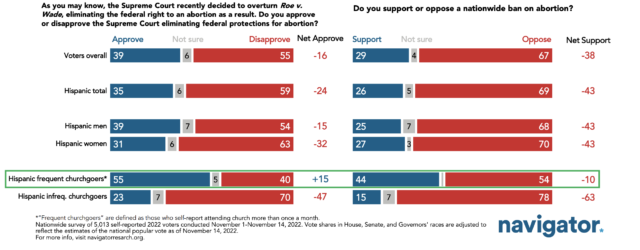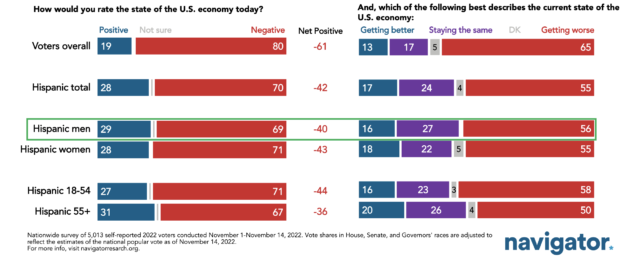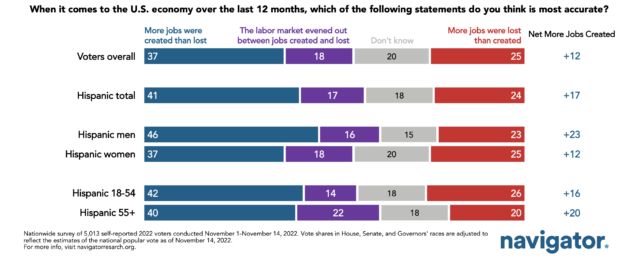What We Did: 2022 Midterm Voters Survey
The slides in this presentation are based on interviews with 5,013 registered voters who had already voted or planned to vote in the November election, with interviews conducted November 1st through November 14th . Support for Democratic candidates and Republican candidates in elections for Governor, Senate, and the House of Representatives have been adjusted to reflect the actual expected results as of November 14th . The analysis aims to provide a new tool for Americans to understand what happened in the 2022 election, why it happened…and what’s next.
Key takeaways
- Hispanic voters favored Democratic candidates in the House and Senate – especially Hispanic voters who reported attending church less than once a month.
- Inflation, abortion, jobs and the economy, and guns were Hispanic voters’ top issues; Hispanic men were more likely to say economic issues while women were more likely to say abortion.
- Hispanic voters approved of Biden more than the overall electorate, particularly on health care and abortion; however, their ratings were underwater on his handling of the economy, immigration, and crime.
- Social Security and Medicare, abortion, climate, health care, and democracy were top reasons Hispanic voters chose Democrats over Republicans. • Hispanic voters were slightly less pessimistic on the economy than 2022 voters overall, with a plurality saying more jobs were created than lost.
Hispanic Voters Favored Democratic House and Senate Candidates, Particularly Infrequent Churchgoers
Infrequent church attendees were among the Hispanic voters most likely to support Democratic candidates for the House of Representatives (67%) and U.S. Senate (65%).
Hispanic Voters’ Priorities: Inflation, Abortion, Economy, Guns
Hispanic men were more likely than Hispanic women to cite inflation (46% vs. 38%, respectively) and jobs and the economy (37% vs. 19%), while Hispanic women were more likely to mention abortion (38% vs. 30%) and guns (32% vs. 17%).
Hispanic Voters Approved of Biden’s Job Performance Overall, But Disapproved on the Economy, Crime, Immigration
Biden overperformed among Hispanic voters compared to the total electorate by a net 18 points on the pandemic (net +6 overall vs. +24 among Hispanic voters), 16 points on health care (net -3 overall vs. +13 among Hispanic voters) and 18 on abortion (net -8 vs. net +10).
Hispanic Voters Saw SS/Medicare, Abortion, Climate, and Health Care As Top Reasons to Vote Democratic
Majorities of Hispanic voters said issues including Social Security and Medicare, abortion, climate, health care, and democracy were reasons to vote for Democrats over Republicans. On the issue of immigration, Hispanic voters were split (38% Democrats, 38% Republicans).
Hispanic Voters Received More Outreach From Democratic Candidates Than Republicans
A majority of Hispanic voters said they were contacted by Democrats (53%) – but 40% also said Republican candidates contacted them.
- The gap was wider among Hispanic women, with 53% contacted by Democrats and 37% by Republicans, as well as younger Hispanic voters (51% vs. 37%). Republicans were most likely to contact Hispanic voters over 55 (47%) and Hispanic men (45%).
Most Hispanic Voters Were Pro-Choice; Frequent Churchgoers Approved of Overturning Roe, But Opposed Nationwide Ban
Nearly three in five Hispanic voters overall disapproved of the Supreme Court overturning Roe v. Wade (59%), including majorities of Hispanic men, women, and infrequent churchgoers. Those who attend church more than once a month supported the decision (55%).
Hispanic Voters Pessimistic On Economy Overall; Majorities Said the Economy Was Getting Worse
Majorities of Hispanic voters across age and gender rated the economy negatively and said it was getting worse.
Hispanic Voters Were Slightly More Likely than Voters Overall to Say More Jobs Were Created Than Lost in the Past Year
Hispanic men (46%) were most likely to say more jobs were created than lost.

